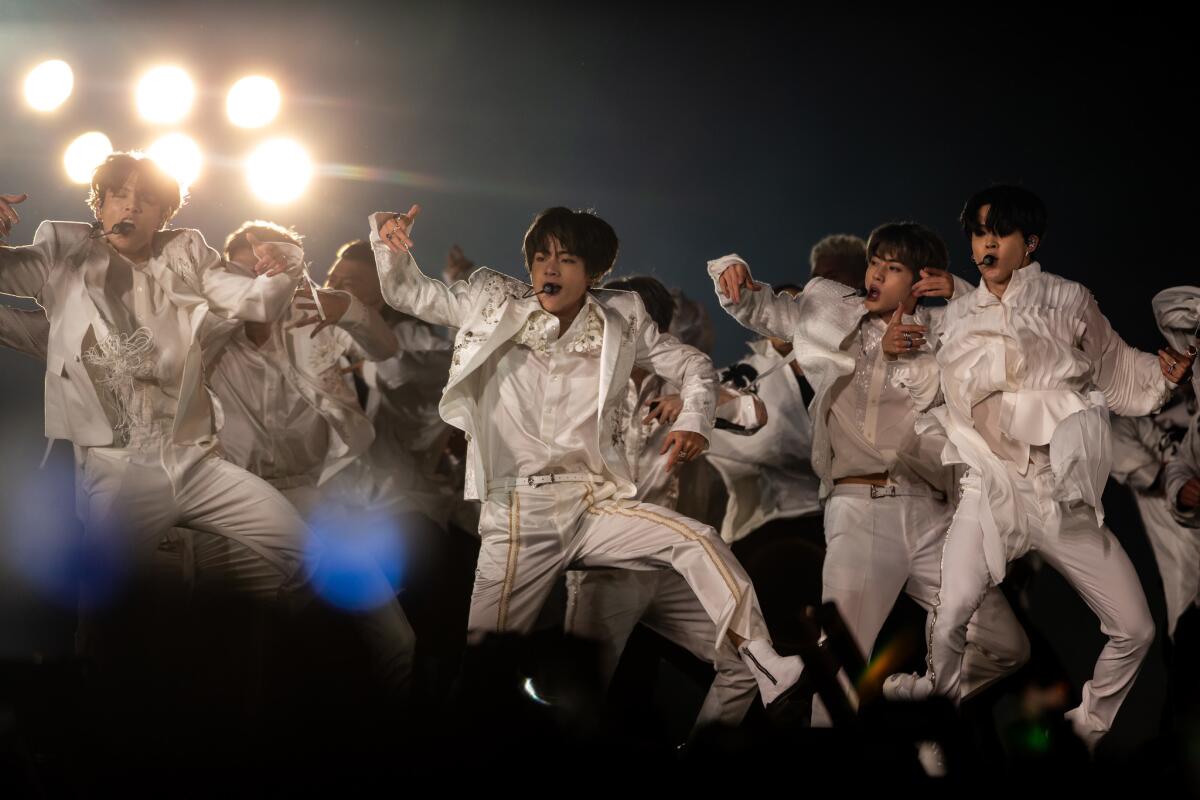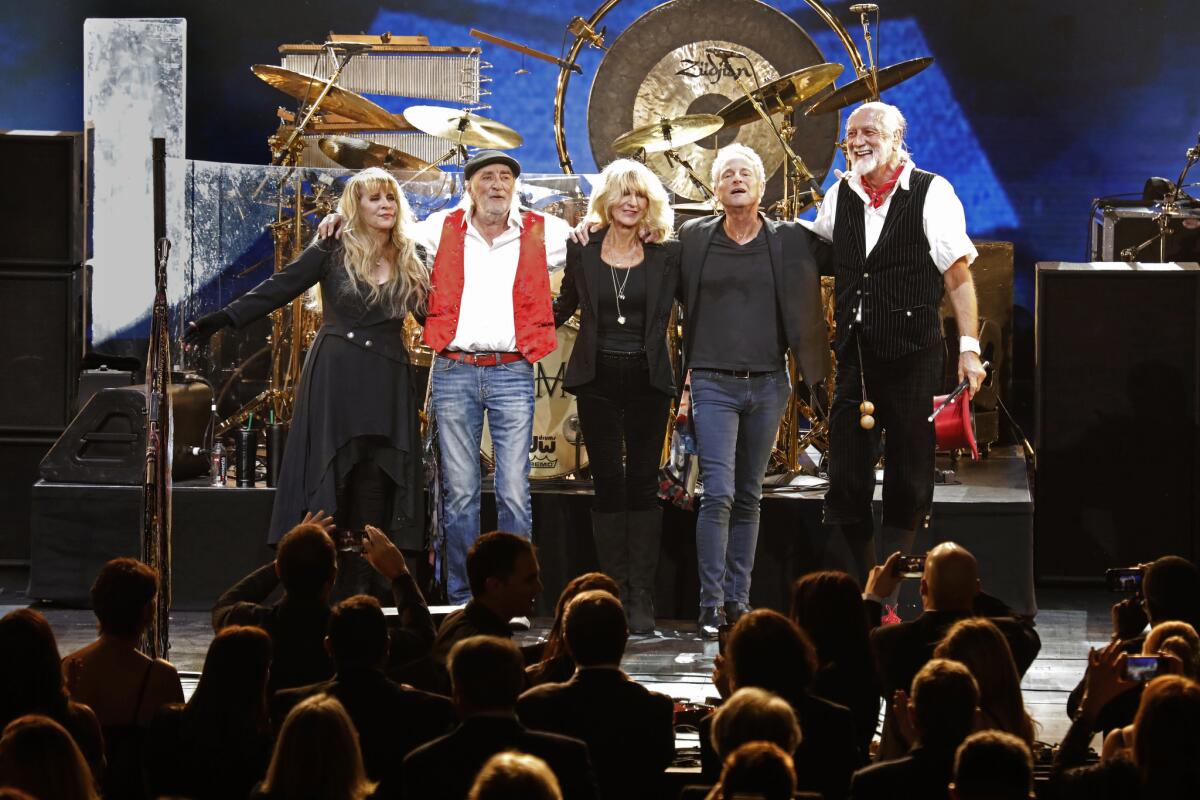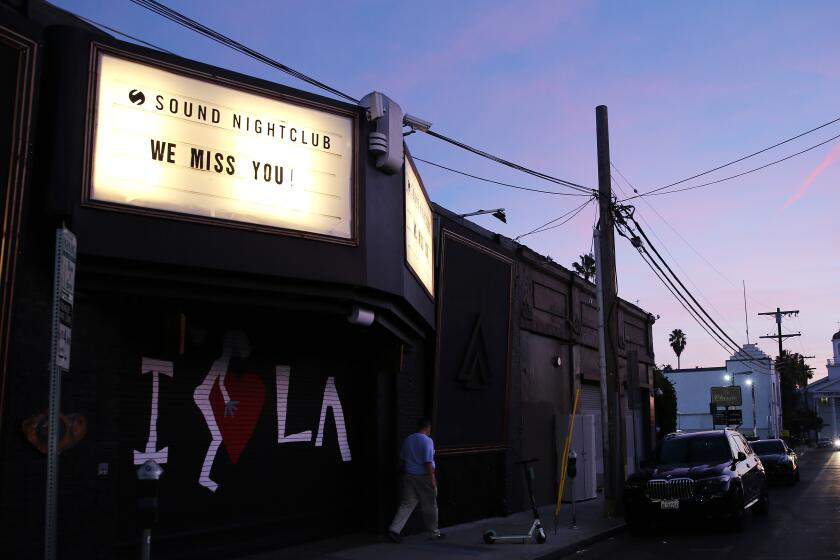Absent its marquee Grammy event, MusiCares turns to BTS for fundraising sizzle

- Share via
For the first time since 1991, the Recording Academy’s affiliated charity MusiCares will not honor a person of the year nor throw its annual gala event in the run-up to the Grammys. That’s no huge surprise; COVID-19 threw pop music’s awards season into chaos, right along with the live music industry.
While the Grammys’ main telecast will soldier on Sunday, with a hybrid of live and pretaped performances from stars including Taylor Swift, Megan Thee Stallion and Harry Styles, what’s normally the biggest weekend of the year for one of the industry’s bedrock charities is instead a humbling reminder of the damage COVID-19 wreaked across the music business.
“We know from our clients how bad the need has gotten,” said Laura Segura, executive director of MusiCares. “Work is not coming back soon, and people are still at home. In our surveys, 51% [of industry pros] said they had low confidence that they could even afford basic living expenses; 26% are experiencing moderate to severe depression. We’ve never seen anything like the size and scope of this need.”
A streaming-only concert event, Music on a Mission, will fill in some of that gap with performances from K-pop megagroup BTS, John Legend, Haim, H.E.R., Jhené Aiko and others on Friday. But it’s yet another reminder of the toll the virus has taken on an exhausted industry.
“As the COVID-19 situation worsened, our plans were disrupted, including tours,” wrote BTS’ J-hope via email. “Things that were so natural and normal before became impossible. This period was a strong reminder of the importance of the things that I enjoyed as a musician.”
Our experts forecast wins for Beyoncé’s ‘Black Parade’ and Taylor Swift’s ‘Folklore,’ and that the odds may be stacked against Megan Thee Stallion.
The Person of the Year gala is typically a ritzy industry-insider night at the L.A. Convention Center, where legacy acts like Aerosmith, Dolly Parton and Fleetwood Mac are feted by an all-star lineup of musicians. It raises millions for MusiCares’ effort in healthcare, financial assistance, addiction counseling and other needs.
Typically, the $2,000- to $8,000-per-ticket concert brings in close to $7 million, far and away MusiCares’ biggest night for fundraising and a marquee event for spotlighting its work to the broader music business. Losing it is a blow to both morale and to MusiCares’ purse.
But given the gulf of desperation that’s opened up as the concert industry took a $9 billion hit over 2020 (and more pain still to come as venues remain shuttered and tours grounded well into summer) and with L.A. County’s continued block on large indoor gatherings, Segura and her colleagues knew that a black-tie event wasn’t possible.

The obvious abyss of need for MusiCares’ services has supercharged the organization’s fundraising — now at around $24 million over the last year. But COVID-19 also sent those funds immediately out the door to 25,000 recipients of services, like MusiCares’ Emergency Financial Assistance program for direct grants, psychotherapy, HIV/AIDS treatment and other programs. Its Wellness in Music survey, released in February, estimated that 62% of respondents had moderate to severe financial stress and that more than half could not afford any therapy or counseling services.
“It’s been more difficult because the whole industry’s having such a hard time, but people know that the need is so great,” Segura said. “If anyone had the means to help, they did.”
It was the worst year for live music in... well, ever. The Times spoke with two dozen musicians and live-music pros to assess the damage done by the pandemic.
Music on a Mission will likely raise only a third of the money taken from a typical Person of the Year gala. But it will also be more accessible to music fans who can now watch BTS and more perform on a $25-a-ticket livestream.
“It was not a hard ask,” Segura said, of getting high-profile performers to beam in for it. “These artists all have crew, who have families and people who are not in the spotlight but are suffering. Artists understand that.”
BTS, one of the world’s biggest touring acts, tried to grapple with the loneliness and anxiety of COVID-19 on its album “Be.” The band’s involvement with MusiCares is an extension of that same work, said the group’s RM.
“As a member of the Recording Academy, we were well aware that MusiCares is helping the recovery of the music community impacted by COVID-19,” he said. “We wanted to help those who try to adjust to the new normal, whether it be creating music or finding new ways to set up performances like virtual concerts, as MusiCares helps smooth that transition period.”
Segura took the MusiCares job in June 2020, after the acrimonious departure of the Recording Academy’s former chief executive, Deborah Dugan, and a now-settled 2019 wrongful termination lawsuit from MusiCares’ former vice president, Dana Tomarken, alleging harassment and misappropriated funds. (The academy’s former chair, Neil Portnow, denied all wrongdoing at the time.) Segura had previously served as vice president of membership and industry relations for the Recording Academy.
When asked about any impact of those negative headlines on MusiCares’ work, she said that “while the Recording Academy is a crucial partner, and we work really closely together on a variety of projects, we are independent companies. We have still been able to help without missing a beat.”
The vast need for MusiCares’ services will continue long after the pandemic subsides and live events are able to resume. Many artists, venue staff and touring professionals will have been without income for a year at least and will be slow to recover in a forever-changed landscape for live music. The Grammys will go on Sunday, but the recovery effort will be needed for months, and maybe years, to come.
“Without live shows, the relief priorities are physical and mental health, and we’ll maintain and expand that for as many months as it takes,” said Segura. “Once that magical day comes when we can have live music back, we’ll reassess. But we shape the organization to serve clients’ needs, and we’re committed to the long haul.”
More to Read
The biggest entertainment stories
Get our big stories about Hollywood, film, television, music, arts, culture and more right in your inbox as soon as they publish.
You may occasionally receive promotional content from the Los Angeles Times.










